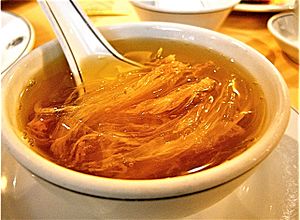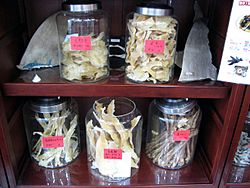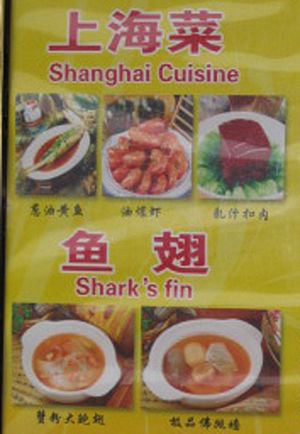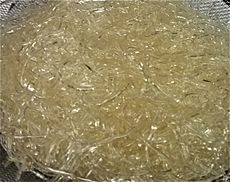Shark fin soup facts for kids
 |
|
| Alternative names | Shark's fin soup |
|---|---|
| Type | Soup |
| Place of origin | China |
| Main ingredients | Shark fins, broth |
Shark fin soup is a soup or stewed dish served in parts of China, Taiwan, and Southeast Asia. The shark fins provide texture, while the taste comes from the other soup ingredients. It is commonly served at special occasions such as weddings and banquets, or as a luxury item.
It has been condemned by the Humane Society International, which states that approximately 72 million sharks are killed each year for their fins. Currently, international concerns over the sustainability and welfare of sharks have impacted consumption and availability of the soup worldwide. Recently, health concerns about the high concentration of BMAA in shark fins have arisen.
Shark fin soup substitutes have lately appeared on the market which do not require any shark fins, thus avoiding the environmental damage caused by the shark finning practice.
Contents
Preparation
Traditional shark fin soup or stew is made with fins obtained from a variety of shark species. Raw fins are processed by first removing the skin and denticles before trimming them into shapes and bleaching to a more desirable coloration.
Sharks' fins are sold dried, cooked, wet, and frozen. Ready-to-eat shark fin soup is also readily available in Asian markets.
Dried fins come in cooked and skinned (shredded) and raw and unskinned (whole), the latter requiring more preparation. Both need to be softened before they can be used to prepare soup.
Taste
The taste of the soup comes from the broth, as the fins themselves are almost tasteless. Rather than for taste, the fins are used for their "snappy, gelatinous" texture, which has been described as "chewy, sinewy, stringy". Krista Mahr of Time called it "somewhere between chewy and crunchy".
Health impact

Shark fins are believed in Chinese culture to have properties of enhancing skin quality, increasing qi or energy, preventing heart disease, and lowering cholesterol. In traditional Chinese medicine, shark fins are believed to help in areas of rejuvenation, appetite enhancement, and blood nourishment and to be beneficial to vital energy, kidneys, lungs, bones, and many other parts of the body.
There are claims that shark fins prevent cancer; however, there is no scientific evidence, and one study found shark cartilage generally to be of no value in cancer treatment. Furthermore, there is no scientific evidence that shark fins can be used to treat any medical condition. Sharks biomagnify toxins, so eating shark meat may raise the risk of dementia and mercury poisoning.
WildAid, a wildlife non-governmental organization, warned that eating too much shark fin can cause sterility in men. It is known that larger fish such as shark, tuna, and swordfish contain high levels of mercury and methylmercury salts. For nursing mothers, young children, and pregnant women or those who wish to be, the United States Food and Drug Administration has advised avoiding consumption of fish high in mercury.
High concentrations of BMAA are present in shark fins. Because BMAA is a neurotoxin, consumption of shark fin soup and cartilage pills may pose a risk for degenerative brain diseases such as Alzheimer's and ALS, as well as Parkinson's disease.
Counterfeit shark fins often also contain toxins.
History

Shark fin soup was reported in Ming dynasty writings and by the Qing dynasty was considered a "traditional part of formal banquets"; in Chinese cuisine, it was considered to be one of the eight treasured foods from the sea. It was popular with Chinese emperors because it was rare, and tasty only after a complicated and elaborate preparation. By the time of the Qing dynasty, shark fin soup was in high demand. Its manual of cuisine, the Suiyuan shidan, indicates that the shark fin was eaten as soup, stew, and even as a stir-fry, but in all cases the fin had to be boiled for two days.
The popularity of shark fin soup rose in the late-18th and early-19th centuries as standards of living began to improve.
Ethical and environmental concerns
Shark fins used in the soup are the cartilaginous dorsal, pectoral and caudal fins. These are regularly harvested by a process known as shark finning, which takes only the fins and discards the carcass, alive or dead. Overfishing poses a major threat to the world's shark populations.
Some groups, such as Fins Attached, Shark Savers, IUCN, Shark Angels, Shark Whisperer and the Sea Shepherd Conservation Society, discourage consumption of the soup due to concerns with the world's shark population and how sharks are inhumanely finned alive and returned to the ocean, unable to swim, hunt or survive. The prevalence of shark finning and the sustainability of shark species are both debated. As of 2011, major hotel operators such as Marriott International, The Peninsula Hotels and Shangri-La Hotels and Resorts stopped serving shark fin soup in favor of offering sustainable seafood. The largest supermarket chains in Singapore – Cold Storage and NTUC FairPrice – have stopped selling shark fins, citing sustainability concerns. Hong Kong Disneyland dropped the soup from its menu after it could not find a sustainable source.
Malaysia's Natural Resources and Environment Ministry banned shark fin soup from official functions in a commitment to the Malaysian Nature Society to conserve the shark species.
In the United States, Hawaii, Washington, Oregon, California, Guam, and the Commonwealth of the Northern Mariana Islands have banned the sale and possession of shark fins, effectively eliminating the availability of the soup. Illinois, which had been a large importer of shark fins, was the fifth U.S. state, and the first non-Pacific state, to implement a ban on shark fin trade. In 2011, U.S. President Barack Obama signed the Shark Conservation Act, closing loopholes used to obtain shark fins. In October 2011, California governor Jerry Brown, citing the cruelty of finning and potential threats to the environment and commercial fishing, signed Assembly Bill 376, banning the possession and sale of detached shark fins. Two Chinese American groups challenged the law in federal court, arguing among other things that it was discriminatory against the Chinese-American community. The federal courts rejected these claims.
In Canada, the Vancouver city council decided to work towards creating a ban to preserve shark species. Toronto joined other regional municipalities in adopting a shark fin ban on 13 October 2011. The Ontario Superior Court of Justice overturned the Toronto bylaw, as it was outside the powers of the city. Calgary banned shark fin soup on 16 July 2012, but in May 2013 shelved the bylaw indefinitely.
On 2 July 2012, the State Council of the People's Republic of China declared that shark fin soup can no longer be served at official banquets. This ban may take up to three years to take effect because of the social significance of the dish in Chinese culture.
The marine conservation organization Bite-Back has campaigned against the sale of shark fin soup in Britain. On the back of its campaigning, the London-based Michelin-starred Chinese restaurant Hakkasan agreed to stop selling the soup. High-profile names such as Gordon Ramsay, Hugh Fearnley-Whittingstall, and Charles Clover, author of The End of the Line: How Overfishing Is Changing the World and What We Eat, have lent their support to the charity's 'Hacked Off' campaign. In 2019, environmental NGO WildAid partnered with Plan B Media on a public awareness campaign to discourage sharkfin soup consumption in Taiwan.
Imitation shark fin soup
Imitation shark fin soup is a noodle soup often sold in small bowls by street vendors in Hong Kong, where it is a common street snack. It is a more ethical and affordable substitute for shark fin soup.
A popular, low-cost imitation shark fin soup (碗仔翅) made using vermicelli is widely available in Asia. They can also be made from cellophane noodles. Seafood companies in Asia later developed edible gelatinous products to imitate shark fins' qualities, commonly referred as "imitation shark fins".
Imitation shark fins

Substitutes for shark include imitation shark fin, konjac gel, various forms of noodles, and others. "Mock shark's fin" soup appeared in Hong Kong during the 1970s. From the 1990s onward, it became popular in restaurants throughout China. The shark fin is replaced with an imitation and edible mushrooms, kelps, seaweeds, bean sprouts, bamboo shoots, and beaten eggs are added, as in the traditional soup.
Imitation shark fin (素翅), typically from Japan, Hong Kong, and Taiwan, is known as sùchì in Chinese Mandarin and sou ci in Chinese Cantonese, literally means "vegetarian fin". A Taiwanese manufacturer's recipe for it contains water, gelatin, alginic acid, sugar, casein, and triolein to reproduce the chewy, gelatinous texture of shark fins. However, some of these imitations absorb the broth more quickly than the real shark fin. Konjac gel (known as moyu tofu in Chinese Mandarin, mo wu dau fu in Chinese Cantonese, and konnyaku in Japanese) can also be used as a substitute for shark fin once it is julienned into thin strands using a chef's knife, produce slicer, or food processor. While cellophane noodles are also often used as an alternative to shark fins, some cooks find them too soft and unable to withstand simmering long enough for flavors to be absorbed, consequently the imitation shark fin or julienned konjac gel are more desirable. Other substitutes include Cucurbita ficifolia (shark fin melon, shark fin soup squash), chicken breast, jinhua ham, vermicelli, soy, sea cucumber, bird's nest, pig's skin and gelatin.
In 2015, a seafood company from San Francisco was working on a variation of imitation shark fin using algae-derived ingredients and recombinant proteins.
Alternatives to shark fin are inexpensive and easier to prepare. Imitation shark fin, konjac gel, and other alternatives can be purchased in preserved form from Asian supermarkets and convenience stores.
Images for kids
-
Yao Ming, a former NBA basketball player who campaigned against shark fin soup.
See also
 In Spanish: Sopa de aleta de tiburón para niños
In Spanish: Sopa de aleta de tiburón para niños
- Buddha Jumps Over the Wall, a soup containing shark fin
- List of Chinese soups
- Three grand soups
- Shark finning



